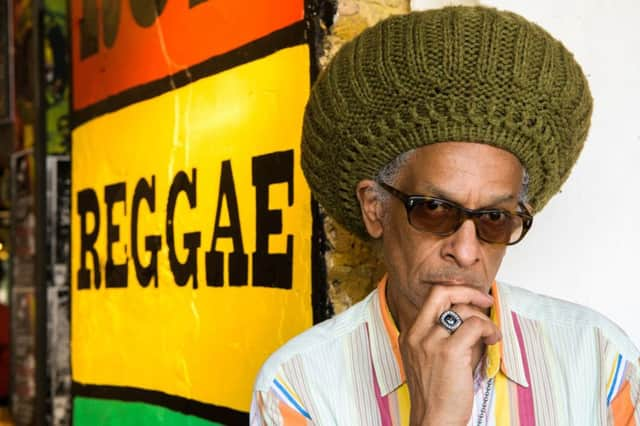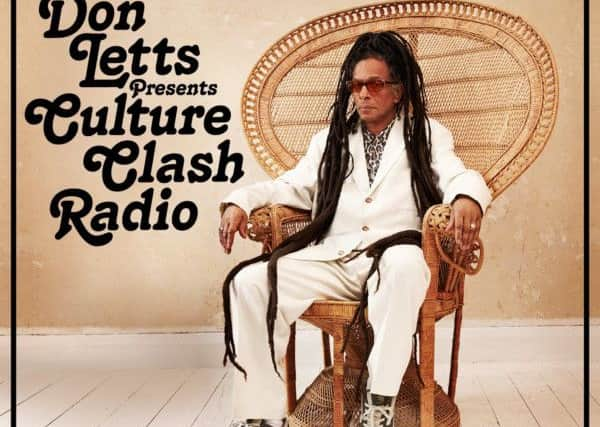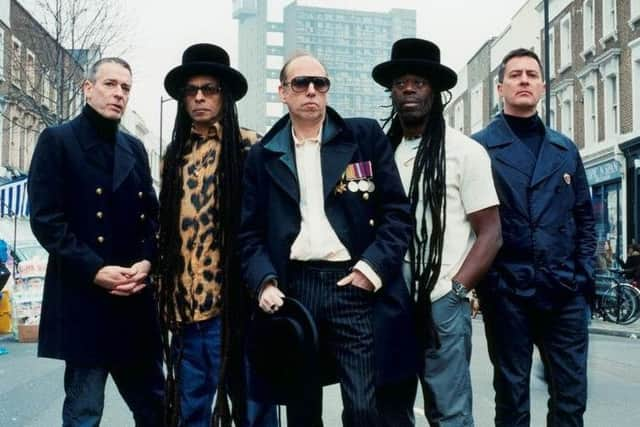Music interview: Don Letts on podcasts, punky reggae and DJ-ing at Tramlines


Don Letts is a busy man at the moment. In the week that he launches a series of podcasts for Turtle Bay restaurants he will also be heading to Sheffield to DJ at the Steel City’s Tramlines festival.
Then there’s a new compilation album, Culture Clash Radio Volume 1, that features music from all around the world in the varied vein of his BBC 6 Music radio show plus his ongoing film making work – most recently on the when punk met reggae documentary Two Sevens Clash, for Sky Arts.
Advertisement
Hide AdAdvertisement
Hide AdExplaining the collaboration with Turtle Bay, the Caribbean restaurant chain who have eateries in Leeds and Huddersfield, the 61-year-old Londoner quips: “They made me an offer I couldn’t refuse – and it tasted good.”


It seems Letts was given free rein to choose tracks for the four podcasts. “They just let me do my thing,” he says. “It’s my personal take on a genre that’s been a big inspiration to me. It’s four episodes – the first examines where these passions started, the second one looks at vocalists and groups that captured my imagination, the third one is all about dub and the fourth looks at the creation and rise of the Jamaican DJ – as in the guy on the mic.”
Having been “there from reggae’s birth”, Letts is steeped in the musical genre. “It’s not something I’ve explored, it’s just been very much part of my life,” he says. “It’s not something I’ve had to go and research. Maybe to double check my dates – I’m getting a little rusty, it’s the downside of my age – but the thing for me is it’s not really a history lesson, I have to say; more of an introduction.”
Although podcasts may be increasingly popular with the download generation, Letts admits he’d never listened to one before doing this project. “I’m too busy,” he says. “I dig the fact that it’s another outlet for creativity – that’s always a good thing – but the outlets that are around at the moment I’ve made the best of, I think, and they keep me pretty busy. Between film making, DJ-ing and my radio show there’s not a lot of time left.
Advertisement
Hide AdAdvertisement
Hide Ad“But here I am about to enter the podcast foray. I was just interested in the podcast as another means of communication, another means of turning people on, passing on that creative energy that helped me be who I am. I’m very much a product of music and the possibilities of music. I’m old school, I still believe in music as being a possibility, a tool for social change as well as entertaining. It’s just that in the 21st century it seems that entertaining is all. No one wants to face reality but it’s a great thing to do that as well.”


Letts feels his reputation for being the first DJ to introduce London’s original punk generation to reggae has “got blown up over the years”. “What I did was turn all the white people that had no interaction with black people on to reggae. Truth be told, people like John Lydon – Rotten as he was known then – Paul Simonon, Joe Strummer were hip to reggae before Don came along. Then again, Paul grew up in Brixton, John was over in the Tottenham area so it wasn’t an alien thing to them. Having said that, a lot of people that came to [London nightclub] the Roxy were from the outskirts, the fringes and didn’t interact with black people, I think they’re the ones that I hipped to the sound.
“There was a propensity for white working class kids to gravitate towards black music, that again started before Don Letts. In the 60s white working class kids might have been listening to stuff from black America then by the 70s, with the whole Windrush thing, these white working class kids were growing up with people like me which would manifest itself in things like the original skinheads – we’ve got to be very clear we’re talking about the fashion version, not the fascist version – that was actually the first multicultural movement in the UK. People forget that because of the whole right-wing thing taking over. But what I’m getting is that before Don Letts and the whole punky reggae thing there were white people digging for instance the Trojan catalogue. I’d like to wear that mantle and say ‘it’s all about me’ but truth be told...”
Musically, he says, reggae got “nothing from punk” but the exposure was crucial. “That’s all it needed – with a little bit of exposure the brothers could do the rest.”
Advertisement
Hide AdAdvertisement
Hide AdHe has a straightforward view of his radio show, which has been running for 10 years on BBC 6 Music. “It ain’t more than Don Letts sharing his musical taste with the rest of the world. I’ve sort of been pigeonholed into ‘Don Letts punk, Don Letts reggae’. But the world’s a big and beautiful place and I don’t know anybody over the age of ten years old that only listens to one kind of music, so that show allows me to be just me, man. There’s no method in the madness other than passing on some good tunes.”


The new compilation album, which includes songs by Nina Simone, Cibo Matto, Bobby Goldsboro and The Moody Blues, he sees as a means of “broadening people’s perceptions of what I’m about”. “I have done a few comps before and they’ve all been very much genre-led. This is about what I do on my radio show. It crosses time, space and genres – that’s my tag line.”
Letts was inspired to take up film making by “Jamaica’s most famous movie” The Harder They Come. “I was totally taken by the way it can inform, inspire and entertain all at the same time,” he says.
“Five years later the whole punk rock thing explodes with the DIY ethic and my white friends started to pick up guitars and I was inspired to pick up a movie camera and reinvent myself as Don Letts the film maker. So it was a culmination of The Harder They Come, punk rock and maybe a Linton Kwesi Johnson poem called Five Nights of Bleeding. I was always struck by how cinematic that track is, it’s incredible. Between those three things I decided that was the road for me.” His recent documentary Two Sevens Clash highlighted what Letts feels is the last untold story from the punk era. “People go on about the punky reggae party but nobody actually examines what the hell it was. As this year is the 40th anniversary – I’m down with the ’77 version – I started to look at all this old material that I had and I realised firstly I had the story of the punky reggae party, because it’s the very first material I shot, so it’s all 40 years old, and of course I filmed what was turning me on and in 1977 it was reggae and punk rock. Now bits of the stuff people have seen over the years but they haven’t seen any of the reggae stuff, there’s performances by people like Big Youth, Culture, Prince Far-I, Dr Alimantado, there’s stuff with me and John Lydon in Jamaica, I’d say about 90 per cent of it’s never been aired before, and it’s the very first material I shot. I guess it’s the genesis of Don Letts becoming a film maker.”
Advertisement
Hide AdAdvertisement
Hide AdLetts’ close friendship with Mick Jones of The Clash led to the pair forming the band Big Audio Dynamite in 1984. Their innovative mix of punk rock riffs, samples and dance beats was influence many groups that followed but after their parting of the ways after two albums, the original BAD have reformed only once, for a well received tour in 2011.


Letts says he’s “too busy trying to pay the rent” to look back on BAD’s legacy. “But having said that,” he adds, “I’m very proud of what we did there because I think BAD signposted the multicultural way that things were heading, and the elements of that band are still the main ingredients of what interests me today – reggae basslines, New York beats, Mick rock ’n’ roll guitar then all the sample and dialogue thing, it’s still at the heart of what turns me on in the 21st century.”
He says the reunion tour was “fun”, adding jovially: “It was my way of dealing with midlife crisis, it’s safer than riding a motorbike.”
Sadly, he says “dignity and probably the fact that Mick doesn’t need to do it” would probably prevent a repeat, but he says: “You know what? I’d do it tomorrow. It was great fun, it was a great way to see the world, it was a great way to have a creative conversation with people.”
Advertisement
Hide AdAdvertisement
Hide AdOn Sunday Letts will be DJ-ing at Tramlines festival in Sheffield. “What I do on the radio wouldn’t work in a club setting. It’s more of a head thing. In the club situation that kind of eclecticism doesn’t work unless you’re sitting down at tables and sofas and chairs. In the club setting my sets are all about the history and legacy of Jamaican music and that island’s gift to the world – which is bass. There’s old school and new school in there as well as stuff that’s informed by reggae.”
Tramlines runs at multiple venues across Sheffield from today until Sunday. For the full line-up visit www.tramlines.org.uk